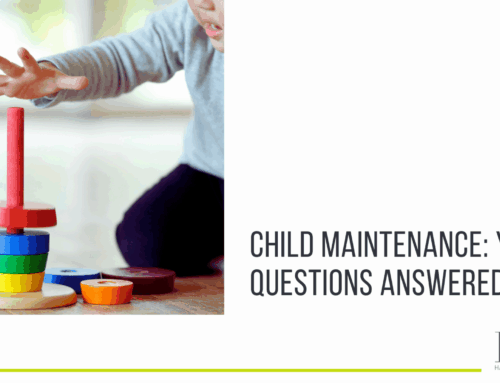When couples who have children together separate, both parents are responsible for contributing financially towards the upbringing of their children, regardless of whether they see their children. Child maintenance is payable for children under 20 and in full-time education.
This area of family law is a minefield with lots of different areas of law overlapping. Our experience really comes into its own in child maintenance cases because we can take steps to make sure the amount paid is fair and that the agreement is legally binding.
What influences the amount?
The amount of child maintenance paid by a parent depends on a number of factors including the paying parent’s gross weekly income, the number of children being supported and the time they spend with each parent.
How is it worked out?
Payments are based on the paying parent’s gross weekly income. For a gross weekly income of up to £800, for example, the maintenance will be 12% for one child, 16% for two children and 19% for three or more children.
Court order
Child support payments must be applied for through the courts if the paying parent has a gross weekly income above £3,000. The courts are also used if payments need to be paid to stepchildren or disabled children, if private school fees are being paid, or if the paying parent lives in a different country.
Does it matter if we’re not married?
The options are slightly different for cohabiting couples. Whether you are married or unmarried, you can use the CMS calculator as a benchmark for a private family based arrangement.
What does gross salary/income mean in the context of the child maintenance calculator?
It is the total amount of salary paid without deducting national insurance or tax. The CMS does allow you to deduct pension payments, however.
What if I see my children often?
If you see your children often, this will impact how much you should pay as the maintenance reduces depending on how often your children stay overnight with you.
What if my spouse is self-employed?
It is still based on gross income and the figures will be established through HMRC.
How do I make sure my ex pays up?
Even if you agree the amounts between yourselves we would always advise setting this out in a Court Order to avoid problems further down the line. If payments are missed, an application can be made through the CMS to obtain the money.
What if his income increases/ my income decreases?
If you are in a private arrangement you should discuss this with your ex and update the calculator accordingly. If you are receiving payment with the help of the CMS, there are quite strict rules on how frequently they will review someone’s income. If you need to go back to renegotiate a Court Order we can help you do this.
Andrew Meehan is individually recommended for family law by both Chambers UK and the Legal 500. He is also a Resolution accredited specialist solicitor for divorce cases involving complex financial and property matters.
This article has been prepared with the aim of providing general information only and does not constitute legal advice in relation to any particular situation. While we aim to ensure that the information is correct at the date on which it is added to the website, the legal position can change frequently, and content will not always be updated following any relevant changes. In addition, everyone’s circumstances are different and this article is provided by way of general information only and must not be relied upon. If you require legal advice on a family law issue, please feel free to contact us by emailing enquiries@harrogatefamilylaw.co.uk. Harrogate Family Law accepts no liability whatsoever in contract, tort or otherwise for any loss or damage caused by or arising directly or indirectly in connection with any use or reliance on the contents of any part of our website, except to the extent that such liability cannot be excluded by law.






